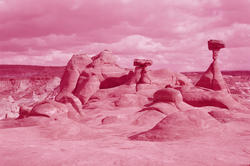Students, faculty and staff take part in collaborative, cross-disciplinary ideation in RISD’s Center for Complexity.
Planning for a Post-Pandemic World

Researchers at RISD’s Center for Complexity (CfC) recently wrapped up Generation C, a weeklong virtual symposium focused on the profound global impact of COVID-19, including the changes it’s triggering with issues of climate, capitalism, community and complexity. Participants from 65 countries around the world contributed ideas and expertise from myriad disciplines. Here the CfC team—Justin W. Cook, Julie Woods, Sahib Singh, Toban Shadlyn and Tim Maly—shares a few insights from the thought-provoking discussions.
The landscape of ideas and observations that we collectively explored over the week was vast: from New Zealand’s promising experiments with new forms of democracy, to the awful effects of systemic racism in the US, to the ways COVID-19 will likely deepen generational divides in wealth, culture and politics.

During the symposium, one somewhat unexpected recurring theme emerged: the unusual nature of time of late. Rather than advancing predictably... time has been both fixed and fluid, slow and fast, precise and blurred simultaneously.
It is critical that we reexamine our relationship with time in order to both better understand our complex world and advance a variety of meaningful changes in society.
“One must be circumspect, looking for the errors our predecessors... made in the process of constructing knowledge of the world.”
In a meditation on maps, architect/educator Bryan Boyer pointed to an ongoing collaboration with the past:
“When one receives the convenient confidence of a map, it’s as if one is collaborating with an invisible group of predecessors to understand the world. They struggled here first so that I may pass with ease. This invisible collaboration is what makes maps conceptually similar to another feature of the contemporary world: silos of knowledge and effort.
But this collaboration requires trust and a willingness to ‘build your work upon theirs.’ In this collaboration, one must be circumspect, looking for the errors that our predecessors have inevitably made in the process of constructing knowledge of the world.”

Systems designer Ignacio Garnham’s reminds us that the stories we tell about the past will shape the future:
“Humans imagine futures using their memories. It is undeniable, therefore, that digging deeper into issues of collective memory will shed light on pervasive practices deeply buried in procedural memory. Yes, the past can be retold, but as Eyal Weizman, Fred Martins and others have shown, it can also be redesigned.”
“Digging deeper into issues of collective memory will shed light on pervasive practices deeply buried in procedural memory.”
In this historic moment, the present looms large in the experiences and imaginations of all of the Generation C contributors. From the killing of George Floyd, Breonna Taylor and Ahmaud Arbery, to hundreds of thousands of COVID-19-related deaths, to the unmistakable present-day impacts of climate change, this moment weighs heavily on all of us.

Don’t Hold Your Breath, author/mapmaker Ingrid Burrington’s acerbic reaction to this moment, eviscerates the present with breathtaking clarity:
“Of course, all of the immediate crises are intertwined and part of the older, deeper crises. Even responding to the pandemic grimly enables the climate crisis by producing mountains upon mountains of un-recyclable hydrocarbon-derived biomedical waste (a curiously discarded detail of the feel-good history of melt-blown polypropylene face masks currently protecting doctors from the virus is that they exist, in part, thanks to the R&D work of the Esso Corporation).”
“Even responding to the pandemic grimly enables the climate crisis by producing mountains... of un-recyclable... biomedical waste....”
The future provides a bit of relief from the present, perhaps because there are still options. But we feel an intense responsibility to prevent relief from becoming complacency—again.
Would design strategist Dan Hill’s proposition of “slowdown”—in our daily lives, in our work culture, as a widely accepted mental construct—help us address systemic challenges by granting a different expected speed at which to operate?

“The use of generational thinking and categories to understand, explain and ultimately assign responsibility for phenomena can quickly hit its upper limits,” writes RISD’s Dean of Liberal Arts Damian White.
And RISD faculty member Nora Khan offers some immediate places to begin looking, through close readings of the simulations and interfaces that define our COVID-19 lives:
“Our interventions can take place in precisely the spaces of no-contact that ultimately determine how we will be in contact in the future. I encourage designers to deploy a vigorous social critique of technology, to recalibrate the metrics of technological fronts that directly shape how we imagine contact and proximity, inclusion and exclusion.”
In our role as a platform for transdisciplinary collaboration and innovation, informed by global and local events through the application of creative practices, we have much to do. We will be looking to connect the insights developed here with our growing network of scholars, practitioners, partners and the RISD community.
illustrations by Cecilia Ruiz commissioned for the symposium
July 8, 2020

